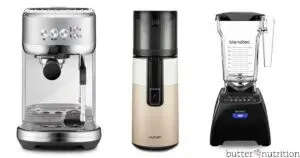
Why Not to Drink Coffee First Thing In The Morning
Drinking coffee first thing in the morning on an empty stomach can spell disaster for so many people. Especially those that are prone to blood sugar issues and chronic stress.
You see, when you wake up first thing in the morning you're in a fasted state. If you body doesn't tolerate fasting well (read: liver issues), you'll be prone to waking up in a more stressed and adrenalized state. This means, stress hormones like cortisol and adrenaline are already surging. Typically eating a balanced breakfast would break the fast and quiet those stress hormones leaving you feeling more calm and collective. However, if you choose black coffee instead of fuel first, it's like pressing the 'MORE STRESS' button as your body will be pushed to run even harder on stress hormones until your next meal, while also setting your body up to be on an unstable blood sugar roller coaster all day.
Some common signs your blood sugar is not stable and coffee is not a great first thing in the AM thing for you are:
- Awaken a few hours after falling asleep, hard to get back to sleep
- Crave sugar or coffee in the afternoon
- Sleepy in afternoon
- Fatigue that is relieved by eating
- Headache if meals are skipped or delayed
- Irritable before meals
- Shaky if meals delayed
- Frequent thirst or urination
These are all indications that your body may be having a difficult time managing blood sugar. Usually, blood sugar regulation is controlled by the liver and pancreas, but when those organs become over-burdened, blood sugar falls too low (hypoglycemia) and triggers your adrenal glands to get involved. The adrenal glands release stress hormones and signal the liver to break down proteins and fats for energy. This causes a lot of bodily stress and inflammation.
If you already have unbalanced blood sugar, drinking coffee first thing in the AM will just make the problem worse (be sure to read the tips about how to enjoy coffee in a healthier way at the end of this article!)
Tolerance Factors
Whether someone reacts negatively or positive to coffee is different for each individual, and it will change with one's diet and health. The two most common coffee tolerance issues I see in my clients are as follows:
Chronic stress and under-eating
Someone who has a history of dieting, malnutrition, or a slowed metabolism will probably not respond so well to coffee at first. This is most likely because those conditions force the body to use the stress response as a coping mechanism for survival due to inadequate fuel. Adding caffeine to their diet will give a sense of "false energy" driving the body into deeper energy exhaustion.
Caffeine Detoxification Issues
Caffeine intolerance (ie. inability to tolerate coffee —makes you feel wired or jittery) can also be a sign of under-active phase 1 detoxification! Yes, that means that your liver is missing key nutrients and/or conditions that allow it to detoxify caffeine efficiently!
Is Coffee Healthy?
On the other hand, when coffee is used with adequate food and nutrient intake, and when a person is not stuck in the stress response, caffeine in the form of coffee can have a very therapeutic and even "vitamin-like" effect according to Dr. Ray Peat, PhD.
According to Dr. Peat's research caffeine is a vitamin-like nutrient:
- Coffee drinkers have a lower incidence of thyroid disease, including cancer, than non-drinkers.
- Caffeine protects the liver from alcohol and acetaminophen (Tylenol) and other toxins, and coffee drinkers are less likely than people who don’t use coffee to have elevated serum enzymes and other indications of liver damage.
- Caffeine protects against cancer caused by radiation, chemical carcinogens, viruses, and estrogens.
- Caffeine synergizes with progesterone, and increases its concentration in blood and tissues.
- Cystic breast disease is not caused by caffeine, in fact caffeine’s effects are likely to be protective; a variety of studies show that coffee, tea, and caffeine are protective against breast cancer.
- Coffee provides very significant quantities of magnesium, as well as other nutrients including vitamin B1.
- Caffeine “improves efficiency of fuel use” and performance: JC Wagner 1989.
- Coffee drinkers have a low incidence of suicide.
- Caffeine supports serotonin uptake in nerves, and inhibits blood platelet aggregation.
- Coffee drinkers have been found to have lower cadmium in tissues; coffee making removes heavy metals from water.
- Coffee inhibits iron absorption if taken with meals, helping to prevent iron overload.
- Caffeine, like niacin, inhibits apoptosis, protecting against stress-induced cell death, without interfering with normal cell turnover.
- Caffeine can prevent nerve cell death.
- Coffee (or caffeine) prevents Parkinson’s Disease (Ross, et al., 2000).
- The prenatal growth retardation that can be caused by feeding large amounts of caffeine is prevented by supplementing the diet with sugar.
- Caffeine stops production of free radicals by inhibiting xanthine oxidase, an important factor in tissue stress.
- Caffeine lowers serum potassium following exercise; stabilizes platelets, reducing thromboxane production.
If you want to read more from Ray Peat, you can find his full article here.
Tips for tolerating coffee better — whenever you choose to drink it
How to use coffee in your diet to tolerate it better:
- Don't consume coffee on an empty stomach (i.e. first thing in the morning!)
- Save your coffee for after breakfast to avoid raising blood sugar levels
- Consume coffee with balanced meals containing protein, carbohydrates, and fats
- If you want to drink coffee in isolation, be sure to add cream (fat), honey/sugar (carbs), and collagen hydrolysate (protein) for best tolerance.
- Sometimes coffee is best eliminated while you work on building up your nutrition and reducing sources of chronic stress
- Try transitioning to decaf or half-caf to reduce your caffeine load
- Make sure you are eating enough food to keep your body out of the chronic stress response, ie. survival mode
- Support your liver and detoxification system with lots of nutrient dense and easy to digest carbohydrates like ripe fruits along with anti-inflammatory proteins
My favorite espresso machines:
Looking to upgrade your coffee addition machinery? After a great deal of hands-on research, these are my two favorite machines at a reasonable price point:
- Bambino Plus — great for kitchen with limited space or if you're the only coffee drinker in the house (this is what I use at home).
- Barista Express — wonderful full service espresso machine with grinder that is perfect for a house with multiple coffee drinkers and ample counter space.
Need Help Getting your Blood Sugar Back on Track?
Be sure to check out the following blood sugar health and liver articles:
- The organ that can keep you from losing weight (hint: not the thyroid)
- Overdose of this vitamin can damage your liver
- How to support your blood sugar
I hope this post helps you modify your coffee habit into a way that works for your health and not against it.
Is coffee healthy for your body? Please share in the comments!
PIN IT:
References:
Peat, Ray. Caffeine: A vitamin-like nutrient, or adaptogen. 2006. Retrieved on March 15, 2014 from http://raypeat.com/articles/articles/caffeine.shtml
https://www.cambridge.org/core/journals/british-journal-of-nutrition/article/abs/glucose-control-upon-waking-is-unaffected-by-hourly-sleep-fragmentation-during-the-night-but-is-impaired-by-morning-caffeinated-coffee/398A3EDA8C30EC89ADBB4C74C8E244B0






Erika
I was feeling kinda bad about my coffee after watching Dr. Oz last night, but not anymore 😉
Claire Murray
I haven't been able to tolerate caffeine every since I had liver inflammation a few years back (which I think was triggered by prescription medications that I had been on for 3 years...not that my doctor would accept this explanation). I would love to be able to drink coffee again! Thanks for a great post!
Nicole
Is organic coffee better than traditional?
Joel Bruce Wallach
Nicole, my wife and I both find that organic coffee feels smoother, tastes more satisfying, and has a generally higher vibration than non-organic coffee.
Tania
WOW...got a light bulb moment. I think my body is stuck in the stress response. I have Hashimoto's disease and every since trying medication its screwed up my eating, lost my appetite. Now I can't eat much and am always in that............... because those conditions force the body to use the stress response as a coping mechanism for survival due to inadequate fuel....... How can I get out of this response? HELP!!!!!
I only drink tea, no sugar, a little milk.. But I cant have much or I'm hyper.
Lisa
Tania, search for Dr. Izabella Wentz, the Thyroid Pharmacisyt, and see if her info can help you.
Kate
I have to come back and say thanks for your article about how thyroid issues are prevalent today. I took it on board the point about self inducing hypothyroidism with low fat low carb dieting. From there, I eventually found the Ray Peat dieting principles which includes coffee drinking. I LOVE coffee (which means my body needs it!) Drinking it in the balanced why Dr Peat advocates and eating properly for hypothyroid has had marvelous results so far - energy is on the rise and I am starting to lose weight by eating more sugar and saturated fats. Thyroid stimulating hormone level is coming down also. If you tolerate coffee I highly recommend its consumption within the balanced formula.
Sally
I love this article because I've never seen anything like it! I'm a lover of coffee but my body doesn't respond well when I drink it. Now, though, I know that it may be a liver detox issue. Thank you for this information and new perspective!
Suzanna & Donald Keats
If you add a good size tbs of coconut oil to your creamer or milk (some folks even use butter along with it), your stomach won't burn like mine does. That's if you have gastritis or an ulcer. And it really tastes good and creamy that way.
Marisa
I appreciate this article. I have low iron and sympathetic nervous system dominance, and when I stopped drinking coffee, I started feeling a lot better. I REALLY miss it though! If we were all exactly the same, then every single one of us could drink coffee and it would have the exact same effect. This is why even herbs like Valerian put some to sleep, and others (like me) it makes hyper. Different genetics!
This is a fantastic article showing how genetically, we are actually different and some of us can't eat or drink things that others can (makes me think about the vegan post and comments of people who think everyone is the same and can go vegan).
If we can't all even drink coffee, then we can't all thrive off the exact same diet or drinks either. Or I could do like some do with different diets and go on a coffee shaming streak where I try to get everyone to stop drinking it simply because "I feel better not drinking it" and since we're "the same" that should be enough evidence to convince everyone and give me the right to be judgmental. I think not.
laura conville
What about decaf coffee? How might decaff coffee, benefit or not? I can tolerate a small cup of reg coffee a day and feel it is beneficial, however more than that and I feel jittery.